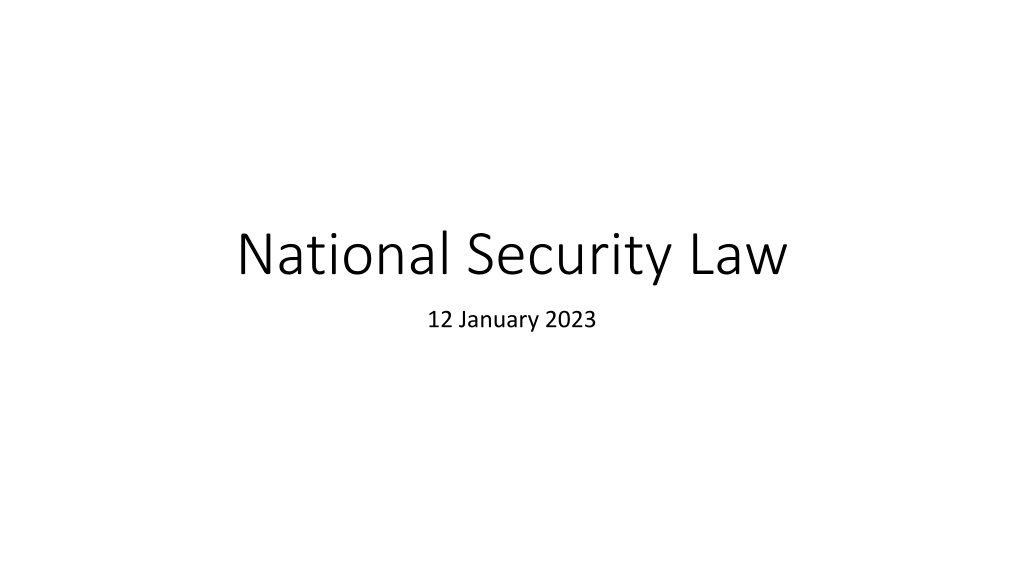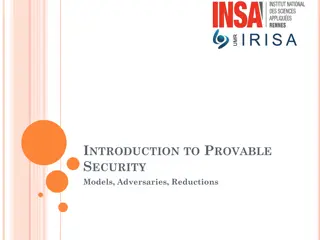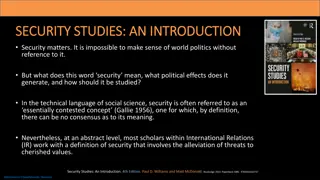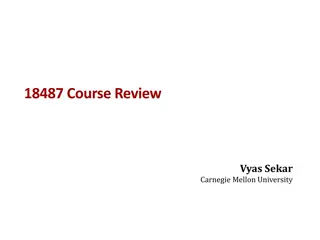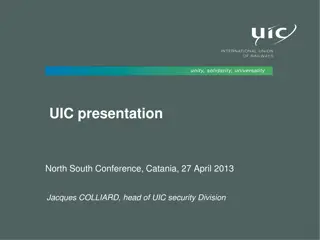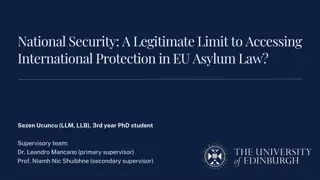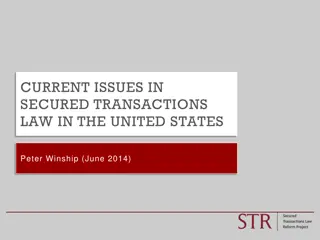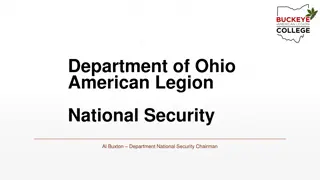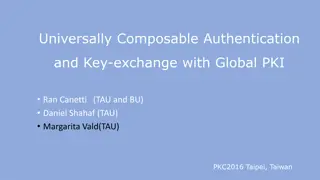Insights on National Security Law and Goals
Explore the concept of national defense and the interplay with civil liberties, the evolving goals of national security since 1985, and key legal issues surrounding areas like military abroad, domestic threats, and natural disasters. Delve into the historical context of common law, the US Constitution, and presidential war powers to understand their implications today.
Download Presentation

Please find below an Image/Link to download the presentation.
The content on the website is provided AS IS for your information and personal use only. It may not be sold, licensed, or shared on other websites without obtaining consent from the author. Download presentation by click this link. If you encounter any issues during the download, it is possible that the publisher has removed the file from their server.
E N D
Presentation Transcript
National Security Law 12 January 2023
The Central Legal Issues [T]his concept of national defense cannot be deemed an end in itself, justifying any exercise of legislative power designed to promote such a goal. Implicit in the term national defense is the notion of defending those values and ideals which set this Nation apart. For almost two centuries, our country has taken singular pride in the democratic ideals enshrined in its Constitution. : : : It would indeed be ironic if, in the name of national defense, we would sanction the subversion of one of those liberties : : : which make the defense of the Nation worthwhile. [United States v. Robel, 389 U.S. 258, 264 (1968).] [T]he concept of military necessity is seductively broad, and has a dangerous plasticity. Because they invariably have the visage of overriding importance, there is always a temptation to invoke security necessities to justify an encroachment upon civil liberties. For that reason, the military-security argument must be approached with a healthy skepticism. : : : [Brown v. Glines, 444 U.S. 348, 369 (1980) (Brennan, J., dissenting).]
What is the Goal of National Security? Go to Reagan NSDD238
National Security Law Topics The use of the military abroad and the conduct of foreign affairs Generates little case law because standing is almost impossible and if you get it, the president s discretion is broad. Countering foreign threats within the US and involving US persons internationally. The constitution is generally not implicated until you are in the US or dealing with US persons. Domestic terrorist threats and insurrection The constitution applies. Generally, looks like criminal law, but with a relaxed 4thAmendment. Plagues and Pandemics Where I got started. Natural disasters Asteroids, floods, hurricanes, major extreme weather events, and other events, domestic and international that can impair readiness or cause geopolitical instability. The domestic role of the National Guard
Why are We Talking about the 17 & 1800s? Common law is based on precedent, especially in the absence of specific statutory direction. Civil law should not care about history, but civilians are as obsessed with history as common lawyers. The US Constitution is a short, general document that provides little specific direction. The Constitution was written in a time very different from today, based on assumptions, not all of which are still valid. The Constitution is difficult to amend. It took the bloodiest war in US history to add a few amendments on individual rights, and then it took nearly 100 years for the Court implement key provisions of those amendments. The current court is rethinking how these amendments were implemented. Most importantly, Congress has never passed a comprehensive framework for presidential war and emergency powers. Now that the Supreme Court has spent 200 years ratifying the powers of the president in the absence of legislation, the Court might not remember that the founders thought that Congress would control war powers.
The Nature of Man and the Role of Government in the 18thCentury Hobbs People are inherently fractious and at war. Without a strong hand, life will be nasty, brutish, and short. In this period, the model for this strong hand was a monarch. Locke and Rousseau People are inherently peaceful, but in society they need a social contact to maintain peaceful order. A social contract implies consent of the governed, and thus some sort of democracy/representative government.
The Drafters Assumptions That Affect National Security Law (This is not to downplay the core failure of the drafters to deal with slavery.) They appreciated the problem of factions but did not see that political parties could undermine checks and balances when the same party captured more than one branch of government and unified the decisions of that otherwise fractious legislators and jurists. They planned for a small country protected mostly by isolation behind its oceans than by active military. There is a strong argument that they did not intend the Supreme Court to review Congressional action, but to sort out fights between the states.
Congressional War Powers Section 8. [1] The Congress shall have Power To lay and collect Taxes, Duties, Imposts and Excises, to pay the Debts and provide for the common Defence and general Welfare of the United States; but all Duties, Imposts and Excises shall be uniform throughout the United States; [2] To borrow Money on the credit of the United States; [3] To regulate Commerce with foreign Nations, and among the several States, and with the Indian Tribes; [4] To establish an uniform Rule of Naturalization . . . ; [9] To constitute Tribunals inferior to the supreme Court; [10] To define and punish Piracies and Felonies committed on the high Seas, and Offences against the Law of Nations; [11] To declare War, grant Letters of Marque and Reprisal, and make Rules concerning Captures on Land and Water; [12] To raise and support Armies, but no Appropriation of Money to that Use shall be for a longer Term than two Years; [13] To provide and maintain a Navy; [14] To make Rules for the Government and Regulation of the land and naval Forces; [15] To provide for calling forth the Militia to execute the Laws of the Union, suppress Insurrections and repel Invasions; [16] To provide for organizing, arming, and disciplining, the Militia, and for governing such Part of them as may be employed in the Service of the United States, reserving to the States respectively, the Appointment of the Officers, and the Authority of training the Militia according to the discipline prescribed by Congress; . . . [18] To make all Laws which shall be necessary and proper for carrying into Execution the foregoing Powers, and all other Powers vested by this Constitution in the Government of the United States, or in any Department or Officer thereof.
Presidential War Powers Section 2. The President shall be Commander in Chief of the Army and Navy of the United States, and of the Militia of the several States, when called into the actual Service of the United States; he may require the Opinion, in writing, of the principal Officer in each of the executive Departments, upon any Subject relating to the Duties of their respective Offices, and he shall have Power to grant Reprieves and Pardons for Offences against the United States, except in Cases of Impeachment. He shall have Power, by and with the Advice and Consent of the Senate, to make Treaties, provided two thirds of the Senators present concur; and he shall nominate, and by and with the Advice and Consent of the Senate, shall appoint Ambassadors, other public Ministers and Consuls, Judges of the supreme Court, and all other Officers of the United States, whose Appointments are not herein otherwise provided for, and which shall be established by Law: but the Congress may by Law vest the Appointment of such inferior Officers, as they think proper, in the President alone, in the Courts of Law, or in the Heads of Departments. . . .
War Powers and the Control of the Military The drafters thought the Constitution did not provide for a standing army. There were provisions for the President to use state militias in emergencies. There were provision (letters of marque and reprisal, among others) to enlist private ships to government service. The Congressional Declaration of War The key is not the Declaration of War. It is that Congress has to appropriate money to hire and equip the military before the president can make war. There did not need to be a Congressional declaration of peace because Congress could just stop funding the war.
The Standing Army and the Loss of Congressional Control The United States is immediately in conflict with France, and then England, culminating in the War of 1812. Had the English not concentrated on the French, they might have retaken the US. Congress builds up a navy and army and never looks back. Once there is a standing army, the president can use it without having to ask Congress for a declaration of war and money for troops. While we will see a few old cases of Congressional limits on the use war powers, Congress is mostly silent until the end of the Vietnam War. The court finds that the use of the military is a political question, thus closing off citizen suits challenging the President s war powers.
PROVIDING FOR THE COMMON DEFENCETHE ORIGINAL UNDERSTANDING: SUMMARY OF BASIC PRINCIPLES The constitutional text divides war powers between Congress and the President (quantitatively assigning the greater number to Congress), leaving the courts to decide federal questions. However, the text is ambiguous and omits important national security powers, including, for example, powers to repel attacks, collect intelligence, and safeguard national security secrets. Pre-constitutional history and political theory differentiated between a broad royal prerogative to exercise national security powers (especially abroad) and legislative power to make domestic laws and provide funds for government. The American colonial experience taught the Framers of the Constitution to be suspicious of a broad executive prerogative and of a standing army, and that the legislature should control funds for national security, but also that legislative (committee) command of troops in the field as opposed to unified command was inefficient and impractical.
The Framers therefore assigned Congress the power to Declare War (formerly a royal prerogative), as well as to issue letters of marque and reprisal, but made the President the Commander in Chief. Notes of the Constitutional Convention though not the constitutional text itself suggest that this designation included some power to repel sudden attacks. It is likely that the Framers understood Declare to mean either an official announcement of a commitment to war or an act of war, suggesting that the Declare War Clause vests in Congress the power to authorize war either by formal declaration or by a statute authorizing the President to order an act of war. Some scholars have argued, however, that the Declare War Clause vests Congress only with the juridical power to determine legal status or relations in war, leaving to the President the power to decide on war subject only to Congress s power to control or deny funding the war.
